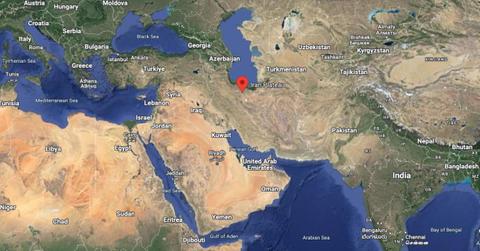After Departing Africa, Where Did Ancient Humans Wander for 20,000 Years? Scientists Now Uncovered the Truth

Researchers say the Persian Plateau — also known as the Iranian Plateau — served as a hub for early humans for a roughly 20,000 year period after the exodus from Africa.
A significant knowledge gap concerning the whereabouts of ancient humans spanning approximately 20,000 years has finally been bridged, experts reveal.
Recent research has identified the Persian Plateau, also referred to as the Iranian Plateau, as a crucial geographical junction in the early migration of Homo sapiens out of Africa.
An international team of scientists unveiled their findings in a study, titled "The Persian plateau served as hub for Homo sapiens after the main out of Africa dispersal," published recently in Nature Communications.
Historians suggest Homo sapiens commenced their migration from Africa roughly 60,000 to 70,000 years ago.
However, their expansion across Eurasia, dated around 45,000 years ago, raised questions about their whereabouts prior to settling in Eurasia.
The geographic location of early humans during this period has posed challenges for researchers to reconcile.
Michael Petraglia, a co-author of the study and director of Griffith University's Australian Research Centre for Human Evolution, remarked, "Our multidisciplinary study provides a more coherent view of the ancient past, offering insights into the critical period between the Out of Africa expansion and the differentiation of Eurasian populations."
The team conducted an analysis of genetic and archaeological data, revealing an ancestral connection between modern populations in the Persian plateau and ancient humans who migrated out of Africa.
"Such a genetic signature was detected thanks to a new approach that disentangles 40,000 years of admixture and other confounding events," stated the Griffith University announcement. "This genetic connection underscores the plateau’s significance as a pivotal location for early human settlement and subsequent migrations."
Additionally, the researchers examined climate records, indicating that the region provided an optimal environment for early settlers, with greater capacity to sustain larger populations compared to areas in West Asia.
Never miss a story — sign up for the Front Page Detectives newsletter. Be on the scene the moment news breaks.
Moreover, simulations of the ancient landscape and climate of the Persian Plateau unveiled its higher elevation during the dispersal of early humans from Africa, potentially providing populations with an advantage over neighboring regions.
Leonardo Vallini, the study's first author from the University of Padova in Italy, highlighted, “The discovery elucidates a 20,000-year-long portion of the history of Homo sapiens outside of Africa, a timeframe during which we interacted with Neanderthal populations, and sheds light on the relationships between various Eurasian populations, providing crucial clues for understanding the demographic history of our species across Europe, East Asia, and Oceania.”
Professor Luca Pagani, the study's senior author, emphasized, “The revelation of the Persian plateau as a hub for early human migration opens new doors for archaeological exploration, enriching our understanding of our species’ journey across continents and highlighting this region’s pivotal role in shaping human history.”
Become a Front Page Detective
Sign up to receive breaking
Front Page Detectives
news and exclusive investigations.
